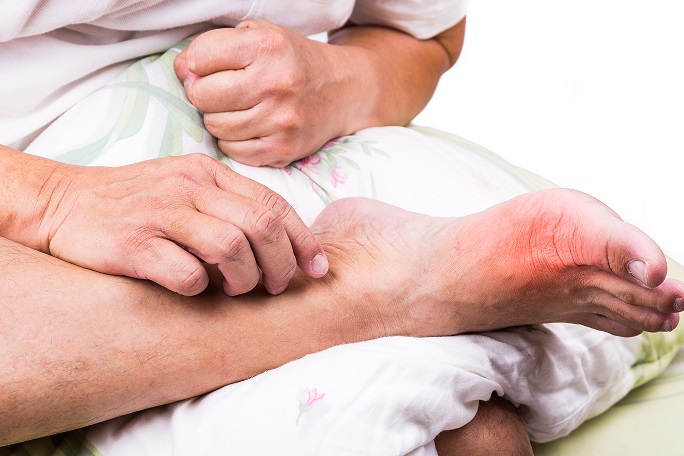If you’ve ever had a bout with gout, you know firsthand how painful it can be. Gout is a subclass of arthritis, replete with intense pain and inflammation, although its etiology differs. Gout is a buildup of too much uric acid in the body. Your body naturally forms purines, that when they break down, cause blood levels of uric acid to increase. Normally, it dissolves in the blood and passes through the kidneys and out through the urine. But if it builds up, it causes urate crystals to form and accumulate in the joints, especially the large toe. These crystals tend to be sharp and can create significant pain, swelling, redness, stiffness, and heat where deposited.
Gout can be brought on by continuous poor diet, obesity, alcohol, drugs, stressful events or an illness. Sometimes it clears up in a few days; other times can last months or years. 15% of people with gout also develop kidney stones.
As is typical of my articles, the question is always “why?” Why can some people have the same risk factors, yet don’t develop gout, while others do? Why are the kidneys not clearing properly? Why can’t I control it without meds?
The answer to the later question is, you can. There are two ways to treat gout when medications are not your preference: acupuncture and nutrition.
Acupuncture helps to reduce the pain, inflammation and swelling and helps to reestablish healthier kidney clearance. This is the fastest option I know.
Dietary factors contribute greatly to gout. Although a high purine diet is frequently associated with gout, purine levels are actually lower during a flare-up. Gout is more likely triggered by an underlying inflammatory condition caused by other factors, such as a high carbohydrate diet. Inflammatory markers such as C-Reactive Protein (CRP) and Interleukin-6 (IL-6) are elevated in the joints during an attack. Foods that are pro-inflammatory by nature are the foods to watch out for.
While fructose in naturally occurring amounts is not generally inflammatory, research has shown that high fructose consumption and high triglycerides can increase uric acid production, and can reduce its excretion. Uric acid in the blood is not always bad. It is there partly for its antioxidant protection, but in excess amounts is pro-oxidative and sets the stage for gout. Sugary drinks and other sugary foods and beer are on the list for the biggest gout-triggers.
While all foods have naturally occurring purines in them, high protein diets are frequently demonized because they are high in purines. What is neglected is that these very foods, such as grass fed beef/organ meats and sea foods contain high levels of Omega 3 Fatty Acids which are protective and help to modulate the inflammatory response, and may also reduce the risk of forming these uric acid crystals. Other foods that have been censured such as mushrooms, asparagus, cauliflower and spinach have factors that help both liver and kidney detoxification, as well as providing critical nutrients. The body also seems to have an easier time clearing purines from vegetables than from meats.
© 2013 Holly A. Carling, O.M.D., L.Ac., Ph.D.







